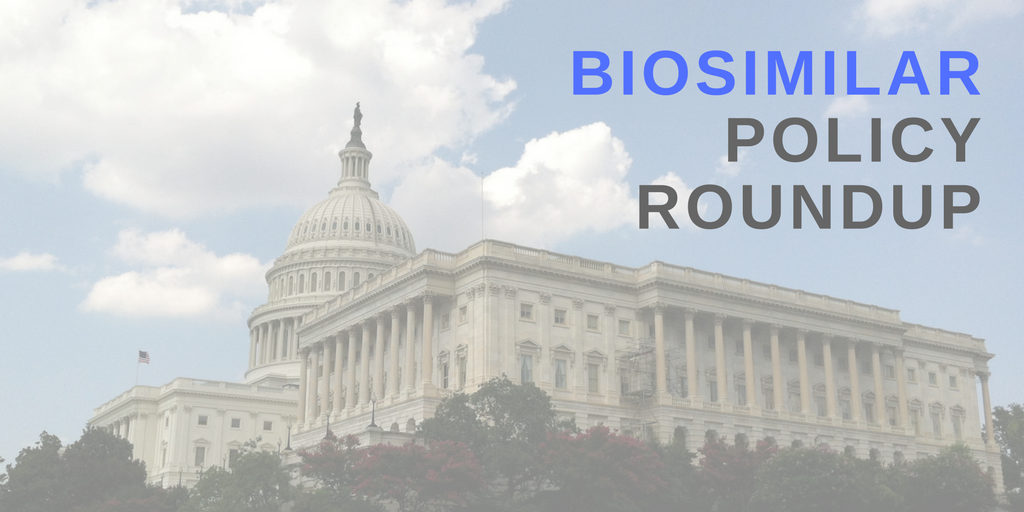- Bone Health
- Immunology
- Hematology
- Respiratory
- Dermatology
- Diabetes
- Gastroenterology
- Neurology
- Oncology
- Ophthalmology
- Rare Disease
- Rheumatology
Biosimilars Policy Roundup: July 2024
July brought a lot of discussion regarding biosimilar policies, in both the US and abroad, as well as 3 highly anticipated FDA approvals.
July brought a lot of discussion regarding biosimilar policies, in both the US and abroad, as well as 3 highly anticipated FDA approvals.

FDA Approvals
Two approvals came through during the first day of the month: Samsung Bioepis’ Pyzchiva (ustekinumab-ttwe) and Formycon and Klige Biopharma’s Ahzantive (aflibercept-mrbb).
Pyzchiva is the third ustekinumab biosimilar approved in the US and the 14th interchangeable biosimilar, meaning that the biosimilar can be substituted for the reference product Stelara (ustekinumab) at the pharmacy without physician approval. It will be available for intravenous and subcutaneous administration to treat conditions such as plaque psoriasis, psoriatic arthritis, Crohn disease, and ulcerative colitis.
Ahzantive is the third biosimilar referencing Eylea (aflibercept) approved in the US. This biosimilar is approved for treating age-related neovascular (wet) macular degeneration and other retinal diseases like diabetic macular edema, diabetic retinopathy, and macular edema following retinal vein occlusion. The approval follows those of Biocon Biologics' Yesafili and Samsung Bioepis' Opuviz in May 2024.
Additionally, the FDA approved Epysqli (eculizumab-aagh), a biosimilar developed by Samsung Bioepis that references Soliris (eculizumab), for treating paroxysmal nocturnal hemoglobinuria and atypical hemolytic uremic syndrome. This is the second approval for an eculizumab biosimilar in the US and the eighth biosimilar approval for Samsung Bioepis. Epysqli was also approved by the European Commission in May 2023 and in the Republic of Korea.
US Policy Updates and Discussion
An article from Sarfaraz K. Niazi, PhD, an adjunct professor of pharmaceutical science from the University of Illinois Chicago and a member of The Center for Biosimilars® Advisory Board, discussed the FDA's new guidelines on interchangeable biosimilars, a classification unique to the US. These guidelines allow developers to claim interchangeability based on existing data without requiring additional trials, addressing concerns that such studies are redundant and potentially abusive. The FDA issued the guideline on June 20, 2024, and introduced educational tools to help stakeholders understand biosimilars. Niazi said he anticipates further regulatory changes to streamline biosimilar approval and reduce development costs, encouraging the entry of smaller companies into the market.
Similarly, in a contributor piece, Kathy Oubre, MS, CEO of Pontchartrain Cancer Center and another member of The Center for Biosimilars Advisory Board, discussed the growth of the biologics market in the US, which has seen an annual increase of 12.5% over the past 5 years and is expected to dominate the top 100 drugs by 2026. Oubre emphasized the importance of employers in promoting biosimilars by educating health plan participants and providers, adopting clinical management programs, designing payment features of prescription benefits to include biosimilars, and addressing biosimilars in pharmacy benefit manager (PBM) contracts.
The language of biosimilars is also a big topic of discussion. An article discussed the development and impact of biologic medicines, which have significantly benefited patients with diseases like autoimmune disorders, cancer, diabetes, and genetic conditions. The expiration of patents on older biologics led to the introduction of biosimilars, which are similar but not identical to innovator biologics, offering greater patient access and reduced costs.
Biosimilar Policies Abroad
A recent study highlighted how Singapore's value-driven health care strategies have led to high biosimilar adoption rates, reducing treatment costs and saving the health care system significant amounts. The study analyzed 5 monoclonal antibody biosimilars from 2018 to 2022, revealing significant price reductions and increased patient treatment numbers, saving the health care system $136 million over 5 years.
A real-world study presented at the 2024 European Congress of Rheumatology found that patients with inflammatory bowel disease or chronic inflammatory rheumatic disease who switched from reference adalimumab to the biosimilar CT-P17 generally felt the switch was necessary, leading to high satisfaction rates. However, 51.3% of patients had problematic or insufficient health literacy, which was not directly linked to satisfaction levels. The study revealed that patient beliefs about the necessity of the switch influenced satisfaction more than health literacy. Researchers concluded that reinforcing patient education before switching to biosimilars could improve adherence and satisfaction.
Newsletter
Where clinical, regulatory, and economic perspectives converge—sign up for Center for Biosimilars® emails to get expert insights on emerging treatment paradigms, biosimilar policy, and real-world outcomes that shape patient care.
